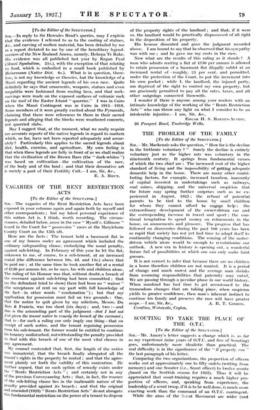VAGARIES OF THE RENT RESTRICTION ACTS
• [To the Editor of the SPECTATOR.] Sia—The vagaries of the Rent Restriction Acts have been exposed in your columns again and again both by myself and other correspondents ; but my latest personal experience of this rotten Act is, I think, worth recording. The circum- stances, detailed below, arose in the case " Myself v. Gillmore " heard in the Court for " possession " cases at the Marylebone County Court on the 15th ult.
Here are the facts : The tenant held a basement flat in one of my houses under an agreement which included the ordinary safeguarding clause, embodying the -usual penalty, against sub-letting. In February of this year he let the flat, unknown to me, of course, to a sub-tenant, at an increased rental (the difference between 10s. 4d. and 14s.) above that he paid me ; at the same time lie took another flat at a rental of £150 per annum for, so he says, his wife and children alone. The ruling of his Honour was that, without doubt, a breach of the covenant against sub-letting had been committed ; that (as the defendant tried to show) there had been no " waiver " (the 'acceptance of rent 'on my part with full' knowledge of the fact—in other words " condonation ") ; but that my application for possession must fail on two grounds : One, that the notice to quit given by my solicitors, Messrs. Du Bois & Francis, was too short (six days) ; and, two :—and this is the astounding part of the judgment—that I had not first given the tenant notice to remedy the breach of the covenant ; that is—for such a ruling can only imply one thing—that on receipt of such notice, and the tenant regaining possession ftom his*sub-tenant, the former would be entitled to continue his tenancy undisturbed, notwithstanding the penalty provided to deal with this breach of one of the most vital clauses in any agreement.
My counsel contended that, first, the length of the notice was immaterial, that the breach finally abrogated all the tenant's rights in the property he rented; and that the'agree- meat plainly- set* forth the validity of this contention. He further argued, that no such option of remedy -exists under the " Rents Restriction -Acts " ; and certainly not in any of the previous Conveyancing Acts ; that, in fact, the essence of the sub-letting clause lies in the inalienable nature of the Penalty provided against its breach ; and that the original and amended (1928) " Rents Restriction Acts" do not abrogate this fundamental restriction on the power of a tenant to dispose
of the property rights of the landlord ; and that, if it were so, the landlord would be practically dispossessed of all right in the disposition of his property.
His honour dissented and gave the judgment recorded above. I am bound to say that he observed that his sympathy was with me ; and he gave me my costs in the case.
Now what are the results of this ruling as it stands ? A man who admits renting a flat at £150 per annum is allowed to retain possession of a basement flat illegally sublet at an increased rental of—roughly, 25 per cent. and permitted, under the protection of the Court, to put the increment into his own pocket ; while I, the landlord, the injured party, ant deprived of the right to control my own property, but am graciously permitted to pay all the rates, taxes, and all other outgoings connected therewith.
I wonder if there is anyone among your readers with an intimate knowledge of the working of the " Rents Restriction Acts " who can throw any light on what I consider to be an intolerable injustice.—I am, Sir, &c.,


































 Previous page
Previous page